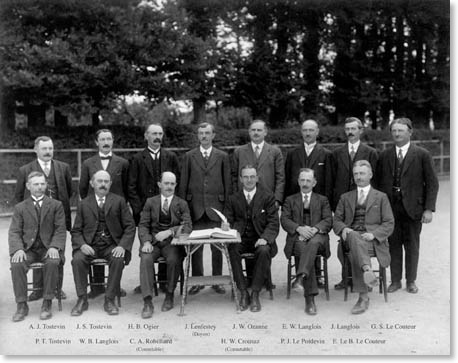
St Pierre du Bois Douzaine
- 1928
Throughout the 20th century the Douzaines
were still a fundamental part of the governance of the
island but the rise of the directly elected Deputy was
inevitable if long drawn out. The franchise (the right to
vote and stand for election) was radically extended after
the First World War in acknowledgement of the sacrifices
made but it was not until 1939 that the voting age for men
and women was equalised (at 20).
When the Douzaines aquired new functions they tended to be
extensions of existing functions, inspecting streams as
they once inspected roads, or they were advisory and
included in clauses of the new laws regulating commerce.
Exceptions to these trends were the States' decisions to
have household refuse collections organized on a parochial
basis and to give the Douzaines the right to issue Sunday
Trading licences themselves.
Membership of States Committees -
As the States grew in power and income the number of States
Committees burgeoned and the Douzaines provided a pool from
which members could be elected. Douzeniers can no longer be
elected by the Douzaine to sit on any States Committee but
they can still be elected by the States to serve. However
the introduction of States Departments in 2004 has reduced
the likelihood of this occuring.
Ballots for States Elections -
The first Deputies were directly elected to the States of
Deliberation in 1899 (nine of them on an island-wide basis)
and the Douzaines, with the Constables, became and still
are responsible for overseeing the electoral ballots.
Involvement in commercial licences -
As the States introduced legislation to licence various
commercial activities, clauses were often included
requiring the Douzaines, with the Constables, to prepare
preliminary reports eg for salles publique, liquor sales,
etc. or to give the Douzaines the right to be consulted
before the issue of video licences, etc.
Inspecting watercourses -
Since the 1930s the Douzaines, with the Constables, have
been required to appoint Streams Committees, by default
themselves, to inspect and report to a Central Committee on
the island’s watercourses.
Organising household refuse collection -
The introduction of a Douzaine-administered parochial
household refuse collection system in 1958 gave the
Douzaines an important new function and greatly increased
cashflow.
Property management -
By mid-century the parishes had begun to aquire secular
property other than cemeteries, eg redundant parish primary
schools. The maintenance and administration of this
property became a customary function of the Douzaines. The
buildings provided the Douzaine with a permanent home for
the first time and the parish with facilities (and a source
of income to subsidise the rates).
The parishes had always had the right to raise taxes for
‘public improvements’ which did not fall into any of the
more specific categories. With the advent of the Reserve
Funds law this right was formally extended to include the
purchase, construction and maintenance of parish properties
other than the Church, the Rectory and the Cemeteries. The
Douzaines therefore now have a wider remit to propose
improvements and extensions to a parish’s public buildings
and land.